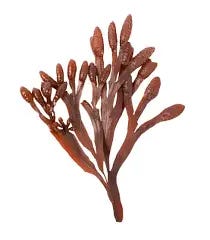To Hack or Not to Hack: Seamoss
Is this trendy seaweed the missing mineral link—or just slick marketing wrapped in green goo?
Welcome back to the “To Hack or Not to Hack” series—where Vango Wellness cuts through wellness buzzwords and breaks down the real science behind the trends. In this third edition, I’m diving deep (literally) into the waters of sea moss. This spongy algae has made its way from coastal traditions to celebrity smoothie bowls—but does it live up to the superfood status?
Let’s unpack what sea moss is, why it’s trending, what the science says, and whether it's a smart addition to your health routine.
🌊 What Is Sea Moss?
Also known as Irish moss (Chondrus crispus), sea moss is a red algae harvested along the Atlantic coasts of Europe and North America. It’s been traditionally used as a thickening agent in food (thanks to its naturally occurring carrageenan), but its rise as a supplement is a modern trend.
You’ll now find it as a gel, capsule, powder, or gummy—often marketed as nature’s multivitamin.
📈 Why Is Sea Moss Suddenly Everywhere?
Blame it on TikTok, celebrity nutritionists, or the rise of mineral-minded wellness—but sea moss is having a moment. Promoted for everything from immunity to skin glow, it's being added to smoothies (hey Erewhon!), skin care, and supplement regimens.
A big part of its appeal? The widely repeated (but unproven) claim that it contains 92 of the 102 minerals the human body needs.
🧪 What’s Actually In It?
Sea moss is indeed nutrient-dense—though not a miracle cure. Here’s what’s inside:
Iodine – critical for thyroid support
Magnesium, Calcium, and Potassium – key for bone, heart, and muscle health
Vitamins A, C, E, K, B-complex – for immunity, skin health, and energy
Fiber – prebiotic properties may support gut health
The caveat? Nutrient levels vary depending on where and how the sea moss is harvested.
🚨 The Caveats & Concerns
As with many wellness trends, there are risks if you overdo it—or if you’re not careful with sourcing.
Iodine overload – Too much can disrupt thyroid function
Heavy metals – Sea moss can absorb toxins from polluted waters
Digestive issues – For some, it can cause bloating or upset stomach
Lack of regulation – Supplements aren’t regulated, and purity varies widely
Vango Wellness Tip: Don’t assume “natural” equals safe. And always check with your healthcare provider—especially if you’re pregnant or managing a thyroid condition.
🔬 What Does the Science Actually Say?
Despite the bold claims made online, clinical research on sea moss is still extremely limited. Most of the evidence is either anecdotal or extrapolated from broader studies on seaweed and algae in general. While animal studies have shown promise in areas like gut health and immune support, human studies on sea moss specifically are sparse.
One 2021 pilot study did suggest that sea moss might improve gut microbiome composition due to its prebiotic fiber—but again, the sample size was small and short-term. No large-scale, peer-reviewed research yet confirms the sweeping health claims often made on social media.
In short: sea moss may be beneficial—but we’re still in early days of understanding exactly how, how much, and for whom.
TO HACK OR NOT TO HACK?
✔️ Hack—but Cautiously and Intentionally.
Sea moss can be a legit source of nutrients, if sourced well and used in moderation. But it's not magic. And it’s certainly NOT a replacement for a balanced, real-food diet.
Sea moss isn’t the only path to these minerals.
Here’s what you can reach for instead:
Iodine – Nori, wakame, or iodized salt
Magnesium – Pumpkin seeds, almonds, leafy greens
Potassium – Sweet potatoes, bananas, beans
B Vitamins – Eggs, whole grains, legumes
Prebiotic Fiber – Chicory root, garlic, oats
Whole foods still win!
But, if you’re curious, here’s how to try it safely:
Start with ½ to 1 tbsp of gel daily in smoothies or tea
Use only from reputable brands (organic, wildcrafted, tested for metals)
Rotate—don’t rely on it every single day
Monitor how your body feels
Think of it as a supplement, not a staple.
If it fits your rhythm, go for it. But don’t let the hype hijack your habits.
Wellness should uncomplicate your life—not add new stressors (or mystery ingredients).
📩 Stay tuned for next week’s To Hack or Not to Hack post—we’re diving into adaptogenic coffee. Mushroom lattes or marketing hype? You’ll find out.
Join the Vango Wellness Community!
💌 Subscribe to our newsletter for more wellness tips.
📲 Follow us on Instagram for daily motivation.
🎯 Book a FREE coaching consultation to start your personalized wellness journey.
Your healthiest, most vibrant life starts with the choices you make today!





